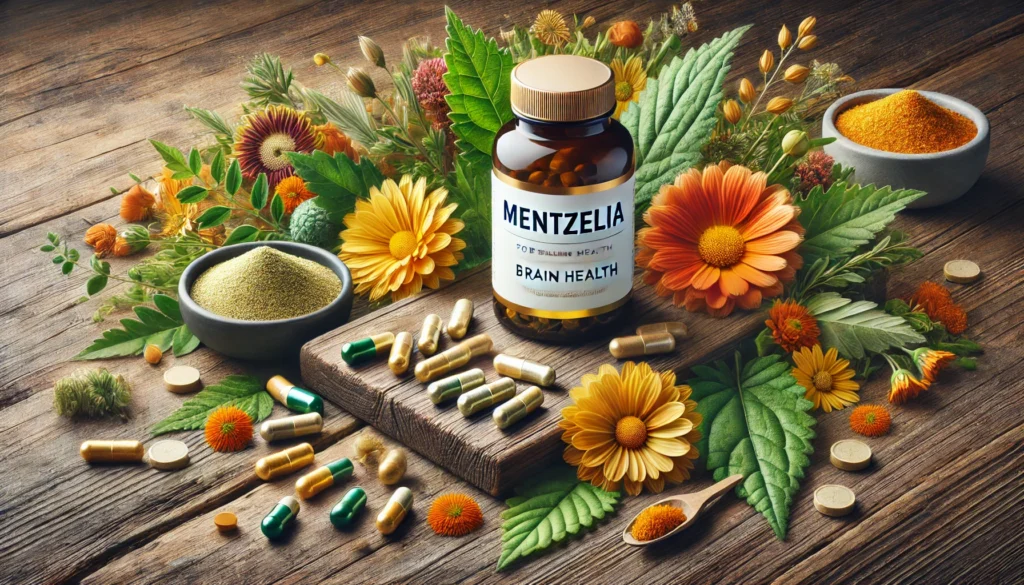Mentzelia, a genus of flowering plants belonging to the Loasaceae family, is primarily known for its medicinal properties, particularly in native and folk medicine. Often referred to as “blazing stars” due to their striking appearance, species within the Mentzelia genus have been utilized for centuries by indigenous peoples for a variety of therapeutic purposes. While traditionally used to treat wounds, digestive issues, and inflammation, recent interest in Mentzelia has shifted toward its potential as a nootropic—substances that may enhance cognitive function and mental clarity.
This article will explore Mentzelia in depth, focusing on its chemical composition, the physiological mechanisms behind its effects on the body and brain, and its potential as a nootropic supplement. Additionally, we will discuss proper dosage guidelines, side effects, drug interactions, and risks for individuals with specific health conditions.
You May Also Like:
Mentzelia: Potential Nootropic Benefits, Dosage, Side Effects, Interactions, and Other Important Information About This Supplement is an original (NootropicsPlanet) article.
Sources of Mentzelia
Mentzelia species are native to the southwestern United States, particularly in the deserts of Nevada, California, and Arizona. The genus comprises a diverse range of plants, but not all species are used for medicinal purposes. The primary medicinal species within the Mentzelia genus include Mentzelia laevicaulis (smooth blazing star) and Mentzelia albicaulis (white blazing star), which are known for their roots and seeds. These parts of the plant are typically harvested and used in traditional herbal remedies.
Mentzelia plants grow in arid regions and are often characterized by their long, thin leaves and showy yellow flowers. The seeds, roots, and stems are the most commonly used plant parts in herbal preparations. Despite its rich history in folk medicine, modern scientific research on the specific medicinal properties of Mentzelia is relatively sparse. However, certain compounds found in these plants are thought to contribute to their cognitive and overall health-promoting effects.
Ashwagandha aids in memory retention and learning—Support Mental Clarity, Buy Today on Amazon!

Chemistry of Mentzelia
The active compounds in Mentzelia that may contribute to its nootropic potential are not fully understood. However, research into other members of the Loasaceae family has revealed that certain alkaloids, flavonoids, and terpenoids likely play significant roles in the plant’s effects on the body.
- Alkaloids: Alkaloids are nitrogen-containing compounds that often exhibit psychoactive properties. While detailed studies on Mentzelia alkaloids are limited, related plant species in the Loasaceae family have been shown to contain alkaloids that affect neurotransmitter pathways in the brain. These compounds may modulate mood, cognition, and alertness.
- Flavonoids: These plant-derived compounds have potent antioxidant properties, which may help protect brain cells from oxidative damage. Flavonoids are known to cross the blood-brain barrier and interact with various neural signaling pathways, supporting cognitive function and potentially enhancing memory, learning, and concentration.
- Terpenoids: These aromatic compounds are widely distributed in plants and contribute to their therapeutic properties. In many plants, terpenoids have been shown to have neuroprotective effects, promoting brain health by reducing inflammation and protecting against neurodegeneration.
The combination of these active constituents suggests that Mentzelia may have multiple mechanisms of action that could contribute to its potential as a nootropic supplement. Although more research is needed to isolate and identify the specific compounds in Mentzelia responsible for its cognitive-enhancing effects, these preliminary insights suggest that the plant may be a valuable addition to the growing body of nootropic supplements.
Physiological Mechanisms of Mentzelia in the Body and Brain
The precise physiological mechanisms by which Mentzelia affects the body and brain are not fully elucidated, largely due to the limited research available on the plant. However, based on the general pharmacological properties of the active compounds found in other Loasaceae species, we can speculate on a few possible mechanisms:
1. Neuroprotection through Antioxidant Activity
Oxidative stress is a leading cause of neuronal damage and cognitive decline, particularly in neurodegenerative conditions such as Alzheimer’s and Parkinson’s disease. Flavonoids and terpenoids, both present in Mentzelia, are well-known for their antioxidant properties. These compounds can help neutralize free radicals in the brain, thus reducing oxidative damage to neurons and supporting cognitive health.
The brain, being highly metabolically active, is particularly vulnerable to oxidative stress. Antioxidants like those found in Mentzelia may help protect the integrity of brain cells, preserve neuronal function, and potentially improve cognitive performance by preventing neurodegenerative changes.
2. Modulation of Neurotransmitter Systems
Alkaloids, found in Mentzelia, are commonly known to influence neurotransmitter systems in the brain. These compounds may act on the dopamine, serotonin, and acetylcholine systems—neurotransmitters that are critical for mood regulation, memory, focus, and learning.
Dopamine, for instance, plays a key role in motivation, attention, and reward processing, while serotonin is involved in mood regulation and anxiety reduction. By modulating these neurotransmitter pathways, Mentzelia may enhance cognitive functions such as memory, concentration, and overall mental clarity. Although direct evidence for Mentzelia’s impact on these systems is lacking, its alkaloids’ known psychoactive effects suggest potential cognitive benefits.
3. Anti-inflammatory Effects
Chronic inflammation is linked to several cognitive disorders, including dementia and depression. Mentzelia’s active compounds, particularly its terpenoids and flavonoids, have been shown to exhibit anti-inflammatory effects. By reducing neuroinflammation, Mentzelia could help improve brain health, enhance cognitive function, and possibly delay the onset of neurodegenerative conditions. Research on similar plant compounds supports the idea that reducing inflammation can have a significant impact on cognitive health.

Nootropic Benefits of Mentzelia
Given its chemical composition, Mentzelia holds promise as a potential nootropic supplement. The following cognitive benefits may be associated with the plant’s use:
1. Cognitive Enhancement and Mental Clarity
Mentzelia may help improve cognitive performance by providing neuroprotective support and modulating neurotransmitter systems. Its combination of antioxidants, alkaloids, and flavonoids suggests that it could help enhance focus, attention, and mental clarity. For individuals experiencing cognitive fog, mental fatigue, or mild cognitive impairment, Mentzelia supplementation could offer a natural means of boosting brain function.
2. Memory Improvement
While research specifically on Mentzelia’s effect on memory is limited, compounds in related plant species have been shown to support memory retention and learning. Mentzelia’s potential to enhance the synthesis and release of neurotransmitters involved in memory formation, such as acetylcholine, could make it a valuable supplement for improving short- and long-term memory.
3. Neuroprotection Against Cognitive Decline
The plant’s antioxidant and anti-inflammatory properties suggest it could help protect the brain from oxidative damage and inflammation—two key contributors to cognitive decline. By neutralizing free radicals and reducing inflammation, Mentzelia may slow the progression of neurodegenerative diseases such as Alzheimer’s and Parkinson’s.
4. Mood Regulation and Stress Reduction
Alkaloids in Mentzelia may help regulate the release of serotonin and dopamine, neurotransmitters that play a central role in mood regulation. As such, Mentzelia may serve as a mild mood enhancer, potentially reducing symptoms of anxiety, stress, and depression. Though not a replacement for prescription antidepressants, Mentzelia could help support emotional well-being and cognitive performance in individuals with mild mood disturbances.

Dosage and Supplementation Guidelines
As a relatively unstudied plant in the context of nootropics, there is no standardized dosage for Mentzelia supplementation. However, based on the concentrations of active compounds in similar herbal nootropics, some general guidelines can be offered.
- Standard Dosage Range: Most herbal supplements derived from plants like Mentzelia typically range from 300 mg to 1,000 mg per day. For a plant like Mentzelia, starting at a lower dose, such as 300 mg, is recommended to assess individual tolerance. If well-tolerated, this could be increased gradually.
- Formulations: Mentzelia supplements are generally available in capsule, tablet, or powdered form. Extracts of Mentzelia that focus on specific active compounds like alkaloids or flavonoids may also be available. It is crucial to follow the manufacturer’s recommended dosage to avoid potential side effects.
- Consultation with Healthcare Providers: Before starting any new supplement, including Mentzelia, it is always advisable to consult with a healthcare provider, particularly if one is pregnant, breastfeeding, or taking medications that could interact with the plant.
Side Effects and Safety
Mentzelia is generally considered safe when used in moderation, particularly when consumed as part of a traditional herbal preparation. However, as with any supplement, there are potential side effects and risks, especially at higher doses.
- Digestive Upset: Some individuals may experience gastrointestinal discomfort, such as nausea or diarrhea, when taking higher doses of Mentzelia. This is common with many plant-based supplements and typically resolves once the body adjusts.
- Allergic Reactions: While rare, allergic reactions to Mentzelia can occur. Symptoms may include rash, itching, or swelling. Individuals who are allergic to plants in the Loasaceae family should avoid using Mentzelia.
- Interactions with Other Supplements and Medications: As Mentzelia may influence neurotransmitter systems, caution is advised when combining it with other nootropic supplements, particularly those that also modulate serotonin, dopamine, or acetylcholine levels. Combining Mentzelia with other sedative herbs or medications may increase the risk of excessive drowsiness.
- Pregnancy and Breastfeeding: Limited data is available on the safety of Mentzelia during pregnancy or breastfeeding. Pregnant and nursing women should avoid using Mentzelia unless cleared by a healthcare provider.
Unlock Brain Health and Mental Resilience with Advanced Bacopa Monnieri—Shop Now on Amazon!

Risks for Individuals with Certain Health Conditions
Individuals with certain health conditions should exercise caution when using Mentzelia:
- Neurological Disorders: People with neurological disorders such as epilepsy or schizophrenia should avoid Mentzelia without professional advice, as it may interact with other treatments.
- Heart Conditions: Since alkaloids can influence the cardiovascular system, individuals with heart conditions should consult a healthcare provider before using Mentzelia.
Conclusion: Should You Consider Mentzelia as a Nootropic?
Mentzelia’s potential as a nootropic supplement is grounded in its diverse array of bioactive compounds, including alkaloids, flavonoids, and terpenoids, which may offer cognitive enhancement, neuroprotection, and mood regulation. While scientific evidence supporting its nootropic benefits is still limited, its antioxidant and anti-inflammatory properties, coupled with its effects on neurotransmitter systems, make it an intriguing candidate for improving cognitive function.
As with any supplement, it is important to use Mentzelia responsibly, adhering to proper dosage guidelines and consulting with a healthcare provider if necessary. Further research will be crucial to fully understand the plant’s mechanisms and its long-term safety and efficacy as a cognitive enhancer. Until then, Mentzelia remains a promising but under-researched option for those seeking natural nootropic support.

References:
- Mentzelia. Retrieved from: https://www.rxlist.com/supplements/mentzelia.htm
- Neuroprotective Effect of Antioxidants in the Brain. Retrieved from: https://pubmed.ncbi.nlm.nih.gov/32998277/
- Neuroprotection with Natural Antioxidants and Nutraceuticals in the Context of Brain Cell Degeneration: The Epigenetic Connection. Retrieved from: https://pubmed.ncbi.nlm.nih.gov/31789133/
- The inflammatory response system of brain: implications for therapy of Alzheimer and other neurodegenerative diseases. Retrieved from: https://pubmed.ncbi.nlm.nih.gov/8866675/
Important Note: The information contained in this article is for general informational purposes only, and should not be construed as health or medical advice, nor is it intended to diagnose, prevent, treat, or cure any disease or health condition. Before embarking on any diet, fitness regimen, or program of nutritional supplementation, it is advisable to consult your healthcare professional in order to determine its safety and probable efficacy in terms of your individual state of health.
Regarding Nutritional Supplements Or Other Non-Prescription Health Products: If any nutritional supplements or other non-prescription health products are mentioned in the foregoing article, any claims or statements made about them have not been evaluated by the U.S. Food and Drug Administration, and such nutritional supplements or other health products are not intended to diagnose, treat, cure, or prevent any disease.


